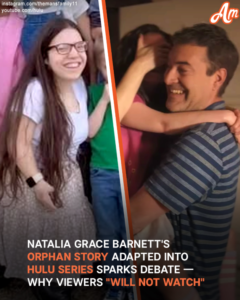Hulu’s upcoming limited series, “Good American Family,” set to premiere on March 19, 2025, delves into the controversial case of Natalia Grace, a Ukrainian orphan with dwarfism. The series stars Ellen Pompeo as Kristine Barnett and Mark Duplass as Michael Barnett, the couple who adopted Natalia. The narrative explores the complexities and conflicting perspectives surrounding Natalia’s age and identity, as the Barnetts alleged she was an adult masquerading as a child, leading to a series of legal and ethical dilemmas.
The casting choices, particularly Ellen Pompeo’s portrayal of Kristine Barnett, have sparked mixed reactions among audiences. While some fans praise Pompeo’s return to television and her venture into a challenging new role, others express reservations. Critics argue that Pompeo’s longstanding association with “Grey’s Anatomy” might overshadow her performance in this series, making it difficult for viewers to dissociate her from her iconic role as Dr. Meredith Grey. Additionally, concerns have been raised about the portrayal of sensitive topics such as adoption, disability, and familial trauma, with some viewers apprehensive about the series potentially sensationalizing these issues.
The real-life case of Natalia Grace has been a subject of extensive media coverage and public debate. Natalia, born in Ukraine with a rare form of dwarfism, was adopted by the Barnetts in 2010. The couple later claimed that Natalia was not a child but an adult posing as a minor, leading them to legally change her age and eventually abandon her. These allegations resulted in legal battles, with charges of neglect against the Barnetts, which were ultimately dismissed. The ambiguity and conflicting narratives have left the public divided, and this series aims to explore these multifaceted perspectives.
“Good American Family” seeks to present a nuanced portrayal of the events, reflecting the conflicting narratives of its central characters. The series is told from multiple points of view, aiming to provoke thought and explore issues like perspective, bias, and trauma. Ellen Pompeo, who also serves as an executive producer, has expressed that the project challenged her both professionally and personally, as it deals with intense and complex subject matter.
Despite the anticipation, some viewers have expressed intentions to boycott the series. Reasons cited include concerns over the ethical implications of dramatizing real-life trauma, potential misrepresentation of individuals with disabilities, and skepticism about the series’ ability to handle the sensitive subject matter with the required delicacy. These apprehensions highlight the broader discourse on media responsibility and the portrayal of vulnerable communities in entertainment.
In conclusion, “Good American Family” endeavors to shed light on the intricate and contentious story of Natalia Grace and the Barnett family. As the series approaches its release, it continues to evoke a spectrum of reactions, underscoring the challenges inherent in adapting real-life events for the screen. The success of the series will largely depend on its ability to navigate these complexities with sensitivity and depth, providing audiences with a thoughtful exploration of a case that has captivated and divided public opinion.
